Sensor Sweep: Antiheroes, Theodore Sturgeon, A. E. van Vogt, Dreadstar
Monday , 17, August 2020 Sensor Sweep 5 CommentsPopular Culture (Adam Lane Smith): Much has been made about the oft-lamented shift from Hero to Antihero and the modern obsession with romanticizing evil. Most frequently, I’ve heard this complaint directed at modern western media’s fixation on selecting one unyielding human trash fire after another as every main character. There’s a reason modern book sales and movie sales are struggling. To understand the shift over the last hundred years of stories and main characters, one must understand the cultural environments and the mental aspects at play, particularly attachment formation and its impact on society.
Writing (Rawle Nyanzi): With every passing day, it seems that global pop 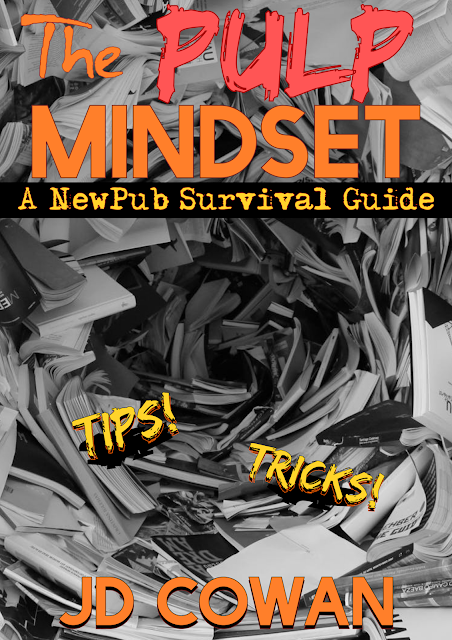 culture disappoints us more. Classic franchises are vandalized into self-parodies to “modernize” them, creative talent increasingly treats fandoms as the enemy, and geek-oriented media champion the intimidation and silencing of creatives who don’t toe a very particular ideological line. The Pulp Mindset is not a book on how to make millions with one simple trick. It is not a book about gaming Amazon’s ever-changing algorithm. It is a book about having the right mentality for storytelling.
culture disappoints us more. Classic franchises are vandalized into self-parodies to “modernize” them, creative talent increasingly treats fandoms as the enemy, and geek-oriented media champion the intimidation and silencing of creatives who don’t toe a very particular ideological line. The Pulp Mindset is not a book on how to make millions with one simple trick. It is not a book about gaming Amazon’s ever-changing algorithm. It is a book about having the right mentality for storytelling.
Hugo Awards (Dark Herald): This years Hugos went so far beneath my radar I didn’t know they had happened. I think we have finally reached the point where a Hugo Award is actually damaging to an author’s reputation. Certainly, no one who loves Science Fiction will want to buy a book with the words Hugo Award winner on the cover. As you may know by now. George R.R. Martin hosted the 2020 Hugo Awards and he was apparently too old to be Woke.
Fiction (DMR Books): Now I don’t have to wait six months to release my 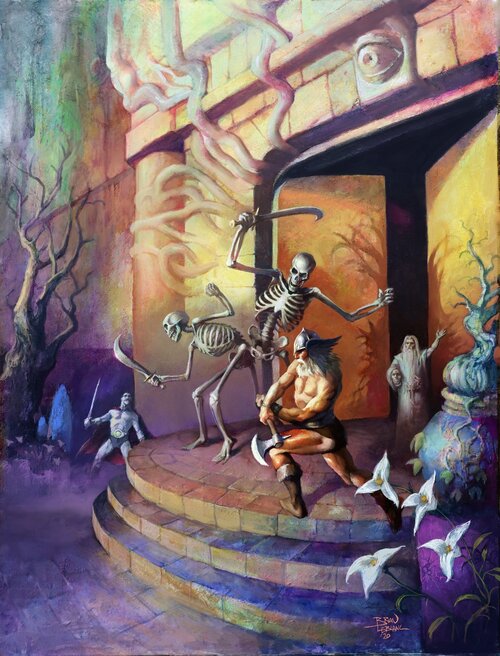 collection! Necromancy in Nilztiria will be available in next month, and the cover illustration (which you can see to the left) is based upon “A Twisted Branch of Yggdrasil.” In this tale, the Norseman Hrolfgar and the Atlantean Deltor have been drawn through the labyrinths of time and space to the world of Nilztiria by a sorceress, who commands them to slay her enemy, Xaarxool the Necromancer. But as you can see this is no easy task, for Xaarxool has giant skeletons to defend him.
collection! Necromancy in Nilztiria will be available in next month, and the cover illustration (which you can see to the left) is based upon “A Twisted Branch of Yggdrasil.” In this tale, the Norseman Hrolfgar and the Atlantean Deltor have been drawn through the labyrinths of time and space to the world of Nilztiria by a sorceress, who commands them to slay her enemy, Xaarxool the Necromancer. But as you can see this is no easy task, for Xaarxool has giant skeletons to defend him.
Fiction (Marzaat): Like most critics, he regards Sturgeon’s supreme strength as characterization. Sturgeon was allegedly good at seeing the cruelty behind civilization and the ways “conventional morality” (supposedly Sturgeon distinguished that from “fundamental ethical systems”) created anxieties and phobias hence some of his horror stories like “Bianca’s Hands”). Stableford contends Sturgeon never was onboard with John W. Campbell’s enthusiasm for science and technology. He suggests that Sturgeon’s “Killdozer!”, with its bulldozer under the control of a hostile alien force, is a hostile metaphor for that enthusiasm.
Fiction (Wasteland & Sky): Much credit should go author and editor 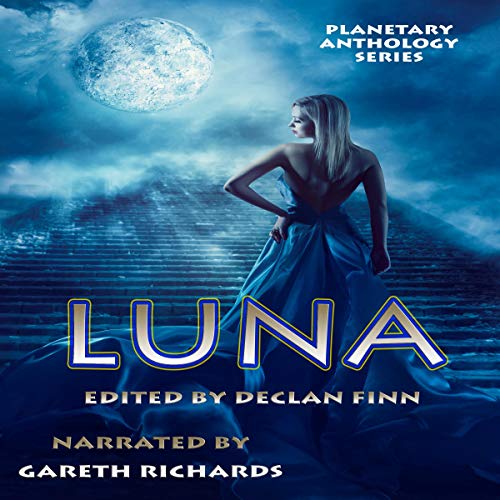 Richard Paolinelli for all the work he has done in the Planetary Anthology series. After Superversive Press shuttered it looked unlikely that the project would ever be completed and was destined to be a what-if, but not only has Tuscany Bay released more volumes than Superversive did (and next month will have re-released all of Superversive’s old volumes), it has also carried the project into a whole new medium. That would be into the burgeoning audio book world.
Richard Paolinelli for all the work he has done in the Planetary Anthology series. After Superversive Press shuttered it looked unlikely that the project would ever be completed and was destined to be a what-if, but not only has Tuscany Bay released more volumes than Superversive did (and next month will have re-released all of Superversive’s old volumes), it has also carried the project into a whole new medium. That would be into the burgeoning audio book world.
History (Jon Mollison): The pre-history of the Americas is a true dark age – a time of great uncertainty and filled with mysteries for which we may 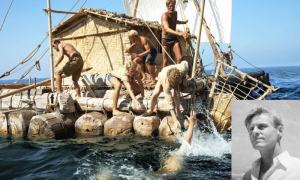 never have solutions. The most basic of these, who was the first to arrive, remains shrouded in conflicting narratives and contradictory evidence provided by scattered and controversial archaeology sites. The question assumes the Bering Straits Theory is the only one that holds water. A rather sizable assumption given the dearth of evidence. And the possible explanation lies in the stone-age sailing ship piloted by Thor Heyerdahl.
never have solutions. The most basic of these, who was the first to arrive, remains shrouded in conflicting narratives and contradictory evidence provided by scattered and controversial archaeology sites. The question assumes the Bering Straits Theory is the only one that holds water. A rather sizable assumption given the dearth of evidence. And the possible explanation lies in the stone-age sailing ship piloted by Thor Heyerdahl.
Dragon Awards (Dragoncon): In this three-part series, past Dragon Award recipients talk about their award-winning novels and their Dragon Awards experience. During this time, nothing provides a better escape from the world than diving into the pages of a Dragon Award winning novel. The Dragon Awards, launched in 2016 in tandem with Dragon Con’s 30th anniversary, allows readers, writers, publishers, and editors a way to recognize excellence in all things Science Fiction and Fantasy. These Awards are by the fans, for the fans, and are a chance to reward those who have made real contributions to SF, books, games, comics, and media.
Cinema (Other Master Cylinder): John Saxon was born Carmine Orrico in Brooklyn, the first child of Antonio and Anna Orrico. His mother was born in Caserta, a small city near Naples in Italy. There’s some confusion about John’s age, partly due to his fiddling’ of the dates for his first contract. “I was born on August 5, 1936. Many have it wrong because I made myself a year older to get a Universal contract at the start. If I had been younger it wouldn’t have worked.”
Review (George Kelly): The 9th book in the Harry Dresden series features 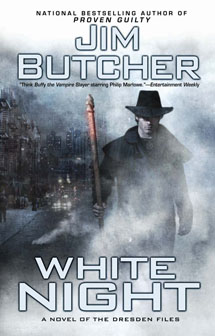 Dresden in a desperate quest to clear his vampire brother, Thomas, from a cunning plot by powerful Magical Interests. Harry Dresden, professional Wizard and Private Investigator for the City of Chicago, grew up an orphan. His upbringing included a lot of physical and mental abuse which explains his taciturn disposition.
Dresden in a desperate quest to clear his vampire brother, Thomas, from a cunning plot by powerful Magical Interests. Harry Dresden, professional Wizard and Private Investigator for the City of Chicago, grew up an orphan. His upbringing included a lot of physical and mental abuse which explains his taciturn disposition.
Comic Books (Totally Epic): Finally! After 3400 pages of Epic Illustrated, 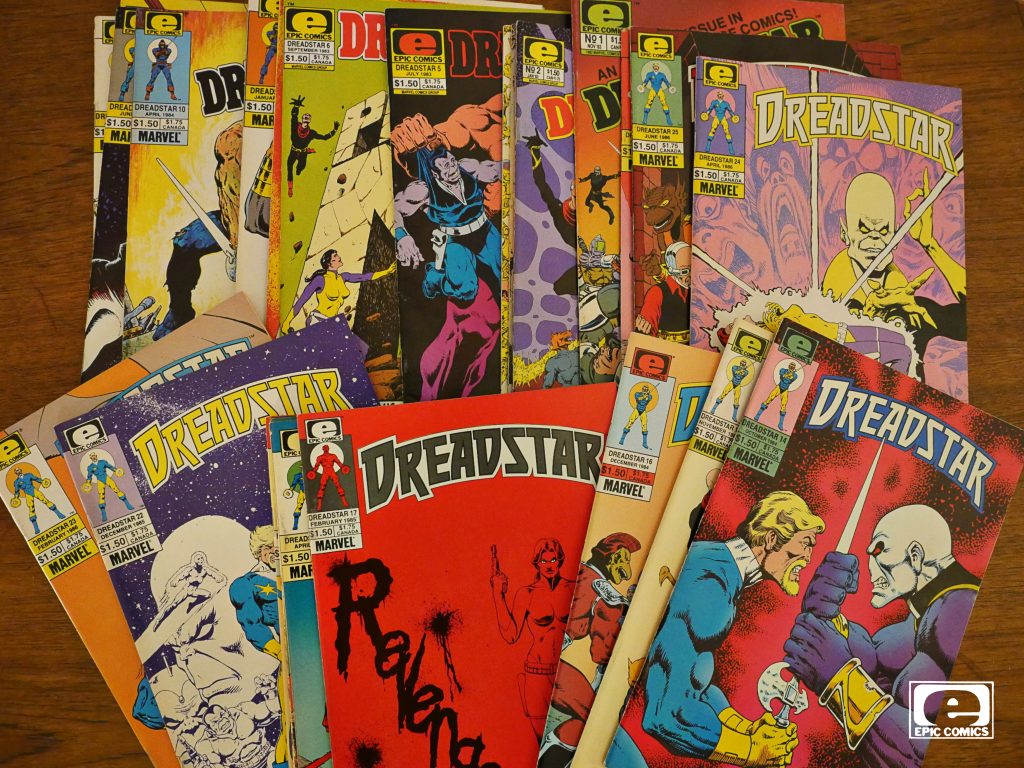 we’ve (that is, I) have finally arrived at the first thing published by Epic Comics! Er, or, rather not, because first we’re doing Marvel Graphic Novel #3, Dreadstar. I mean, I kinda have to, because it bridges the story started in Epic Illustrated and The Price (over at Eclipse) and the Dreadstar series proper.
we’ve (that is, I) have finally arrived at the first thing published by Epic Comics! Er, or, rather not, because first we’re doing Marvel Graphic Novel #3, Dreadstar. I mean, I kinda have to, because it bridges the story started in Epic Illustrated and The Price (over at Eclipse) and the Dreadstar series proper.
Fiction (Amatopia): I’m three-quarters through The Fall of Hyperion by Dan Simmons–sequel to Hyperion and book 2 in the 4 book Hyperion Cantos
series–and I can’t stop singing these books’ praises. I think so far I’ve convinced over ten people to give Hyperion a shot. It has been a long time since I’ve found a novel or series that has engrossed me to this degree, particularly a sci-fi novel.
Fiction & RPG (The Other Side): Over the last couple of years, I have been 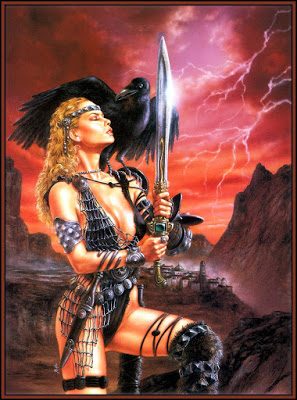 on a quest to find and read all the Raven books by “Richard Kirk” who was, in reality, the pen name of authors Angus Wells and Robert Holdstock. Both wrote Book 1 and then they alternated with Wells on Books 3 and 5 and Holdstock on Books 2 and 4. The story is one that is simple, but close to many FRP gamers. Raven wants to kill Karl Ir Donwayne. How is going to do that? Well, they need to Skull of Quez to appease this ruler to get to Donwayne.
on a quest to find and read all the Raven books by “Richard Kirk” who was, in reality, the pen name of authors Angus Wells and Robert Holdstock. Both wrote Book 1 and then they alternated with Wells on Books 3 and 5 and Holdstock on Books 2 and 4. The story is one that is simple, but close to many FRP gamers. Raven wants to kill Karl Ir Donwayne. How is going to do that? Well, they need to Skull of Quez to appease this ruler to get to Donwayne.
Review (Rough Edges): The Digest Enthusiast, Book Twelve – Richard 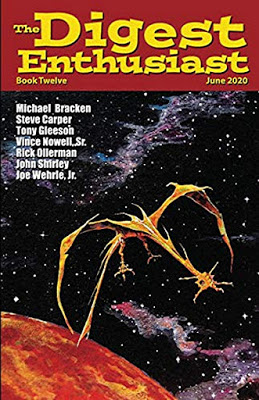 Krauss, ed. Interviews
Krauss, ed. Interviews
- Tony Gleeson (Fantastic, Amazing Science Fiction, Mike Shayne, Personal Crimes).
- John Shirley (Weirdbook, Fantastic, The Crow, Constantine, Wetbones).
Games (25 Years Later): From the very beginning, you are made readily aware of not only the stakes but the epicness of the tale at the heart of 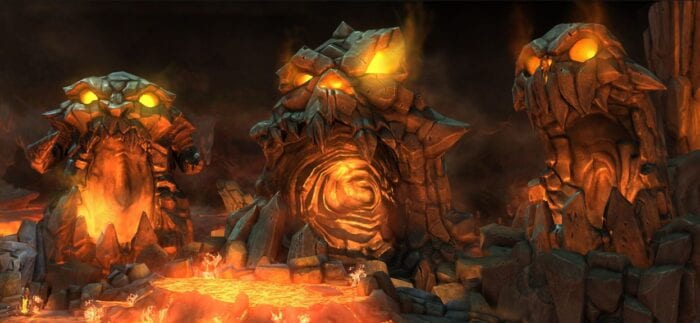 Darksiders. The tale I speak of is at first set in modern-day Earth, and you take up the role of War, one of the Horsemen of the Apocalypse, who finds himself in our realm in the midst of a battle between Heaven and Hell. This is where Darksiders gives us a taste of War’s power before stripping it all away when he is killed during the battle. After War’s demise, he is brought in front of the Charred Council, where the blame of the apocalyptic events is placed squarely on his shoulders.
Darksiders. The tale I speak of is at first set in modern-day Earth, and you take up the role of War, one of the Horsemen of the Apocalypse, who finds himself in our realm in the midst of a battle between Heaven and Hell. This is where Darksiders gives us a taste of War’s power before stripping it all away when he is killed during the battle. After War’s demise, he is brought in front of the Charred Council, where the blame of the apocalyptic events is placed squarely on his shoulders.
Pulp Fiction (DMR Books): The story starts in the “author as ghostwriter” 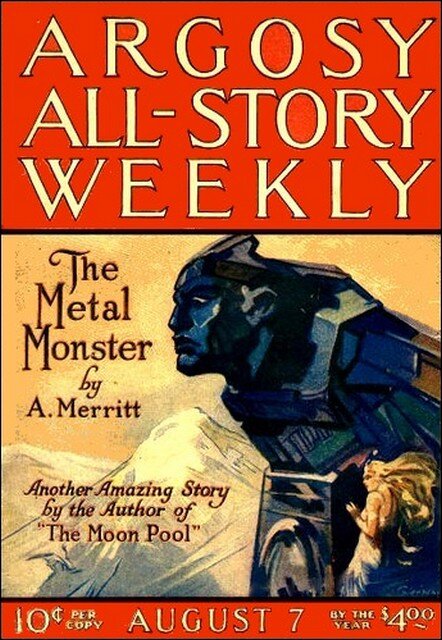 conceit, as was the fashion of the time ever since its popularisation by Edgar Rice Burroughs in his Sword and Planet tales, and indeed utilised by Merritt himself in other stories such as The Moon Pool. So ubiquitous is this method of acclimatising the reader to tales of death-defying derring-do, it almost lulls the reader into a false sense of security – that this adventure will be just another ripping yarn, good for the mental exercise, but could safely be put down after reading.
conceit, as was the fashion of the time ever since its popularisation by Edgar Rice Burroughs in his Sword and Planet tales, and indeed utilised by Merritt himself in other stories such as The Moon Pool. So ubiquitous is this method of acclimatising the reader to tales of death-defying derring-do, it almost lulls the reader into a false sense of security – that this adventure will be just another ripping yarn, good for the mental exercise, but could safely be put down after reading.
RPG (Black Gate): Getting into Conan 2d20, for the casual gamer, or for the 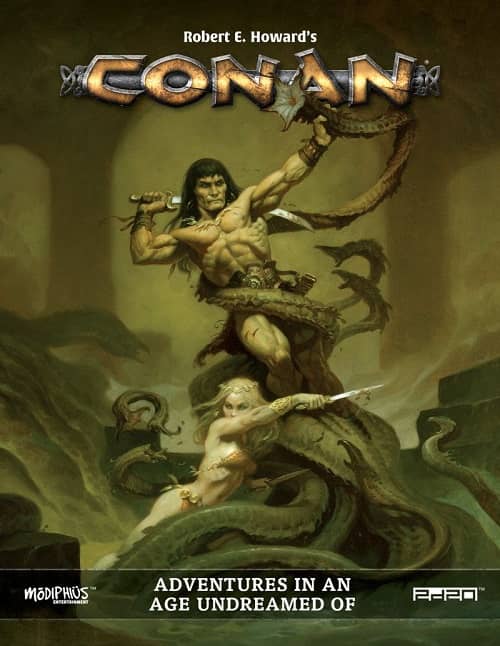 merely curious, demands a fair amount of cognitive load. This is because, I believe, the system is so innovative — and those innovations are precisely what makes this a Conan game. I have encountered many anecdotes of gamers and consumers gleefully obtaining this gorgeous hardcover tome (or PDF), riffling through it, saying, “Huh?” then setting it aside with a “Sorry, not for me, but the art is pretty, and this still makes a good resource.” adventures, the pandemic hit, and these two players weren’t interested in online play.
merely curious, demands a fair amount of cognitive load. This is because, I believe, the system is so innovative — and those innovations are precisely what makes this a Conan game. I have encountered many anecdotes of gamers and consumers gleefully obtaining this gorgeous hardcover tome (or PDF), riffling through it, saying, “Huh?” then setting it aside with a “Sorry, not for me, but the art is pretty, and this still makes a good resource.” adventures, the pandemic hit, and these two players weren’t interested in online play.
RPG (Silver Key): Ideas are a dime a dozen. It’s all about execution. The title of the post should speak for itself, but a little context. Heard on the intranets recently… “Gary Gygax ripped off Dave Arneson! Dave is D&D’s true creator!” My response: Horse shit. Ideas are like a@#$holes. We’ve all got one, and most stink. I can sit here in the calm quiet of my living room and fire off a dozen. “Weight loss app.” “Online mentoring program for pediatricians.” “Telehealth scheduling interface.” “Dying Earth role-playing game.”
Comic Books (Bleeding Cool): Sylvian Runberg writes: “When I was offered to do an adaptation of Conan, I was immediately thrilled, and for several reasons. The first is that this character was a part of my childhood, especially with the comics drawn by John Buscema and obviously the film with Arnold Scharwzenegger. But the second, and maybe the most important reason, is Patrice Louinet, one of the worldwide best specialist of Robert E. Howard, who could advise us during the making of this adaptation, offered me the possibility to discover an another Conan from the one I had in mind from this childhood, a more complex character living in a more complex world, even if we’re still talking about fantasy, magic spells, epic adventures and monsters.
T.V. (Dark Worlds Quarterly): In 1982, Robert E. Howard’s Conan the Cimmerian was brought to the big screen in a film featuring Arnold Schwartzenegger. The success of Conan the Barbarian spawned a plethora of bad Sword & Sorcery films (including Conan sequels). I will make no comment on those films here but state none was better than average and most were far below the worst of the Ray Harryhausen’s classics. Until 1999’s The Thirteenth Warrior I can’t think of a post-Conan film of a heroic fantasy of any real interest. Since the release of Peter Jackson’s The Lord of the Rings trilogy, Fantasy films have been experienceing another renaissance.
Tolkien (The Wert Zone): The Hugo Awards are the premier awards for  science fiction and fantasy literature, first given out in 1953 and every year since 1955. One of the more interesting mysteries of the award is that J.R.R. Tolkien, widely regarded as the most prominent fantasy author of the 20th Century, was never given one despite being eligible on multiple occasions.
science fiction and fantasy literature, first given out in 1953 and every year since 1955. One of the more interesting mysteries of the award is that J.R.R. Tolkien, widely regarded as the most prominent fantasy author of the 20th Century, was never given one despite being eligible on multiple occasions.
Science Fiction (Fantasy Literature): This collection of nine short stories,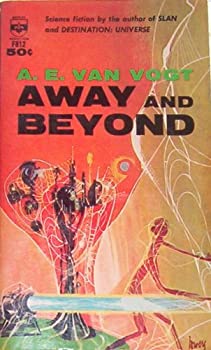 novelettes and novellas originally appeared in hardcover form in 1952, from the publisher Pelligrini & Cudahy, and sold for $3.50. By the time my edition came out, the Berkley Medallion paperback from 1963, with another wonderfully abstract/Surrealist cover by the great Richard Powers, the cover price had dropped to 50 cents but the number of stories in the collection had been reduced to seven. Missing were the novelettes “Vault of the Beast,” from the Aug. ’40 ASF, and “Heir Unapparent,” from that same magazine’s June ’45 issue.
novelettes and novellas originally appeared in hardcover form in 1952, from the publisher Pelligrini & Cudahy, and sold for $3.50. By the time my edition came out, the Berkley Medallion paperback from 1963, with another wonderfully abstract/Surrealist cover by the great Richard Powers, the cover price had dropped to 50 cents but the number of stories in the collection had been reduced to seven. Missing were the novelettes “Vault of the Beast,” from the Aug. ’40 ASF, and “Heir Unapparent,” from that same magazine’s June ’45 issue.
RPG (Grognardia): I bought Mörk Borg solely because of its physical characteristics. A local friend of mine raved about it months ago and then, 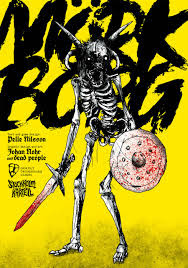 while perusing Free League’s website recently, I caught a glimpse of it in all its lurid glory. I was so intrigued by its bright yellow cover and black, white, and red artwork that I ordered a copy and anxiously awaited its arrival. I was not disappointed when it appeared at last: the 96-page A5 book is sturdy and well-made, like so many European RPG books these days. Most of the paper in the book has a satin finish, but its last section, presenting an introductory adventure, has a rough, natural feel to it.
while perusing Free League’s website recently, I caught a glimpse of it in all its lurid glory. I was so intrigued by its bright yellow cover and black, white, and red artwork that I ordered a copy and anxiously awaited its arrival. I was not disappointed when it appeared at last: the 96-page A5 book is sturdy and well-made, like so many European RPG books these days. Most of the paper in the book has a satin finish, but its last section, presenting an introductory adventure, has a rough, natural feel to it.
Fiction (Adventures Fantastic): Today, July 24, is the birthday of John D. MacDonald (1916-1986). MacDonald wrote for the pulps and transitioned to paperbacks when the pulps died. (I wish someone would collect all his science fiction.) For today’s birthday post, I want to look at One Monday We Killed Them All. Dwight McAran beat a girl to death and went to prison for it. He’s about to get out. Dwight is Fenn Hillyer’s brother-in-law. Fenn is a cop. They don’t get along.
Whoa! Grognardia is back!
-
I thought the same thing1 Mal did a post for BG awhile back. Maybe he’s ready to get his blog on again.
-
That would be great. I’m sorry the bastards were able to bully him off line in the first place
-
He was “bullied” offline? I thought he was having family issues back then.
-
Speaking of the earliest Americans… https://www.ox.ac.uk/news/2020-07-22-earliest-americans-arrived-new-world-30000-years-ago
Earlier than previously thought (and not via Bering Straits), but not as old as Graham Hancock asserts (or would like to believe).